figures of speech (1)
- 格式:doc
- 大小:56.00 KB
- 文档页数:5
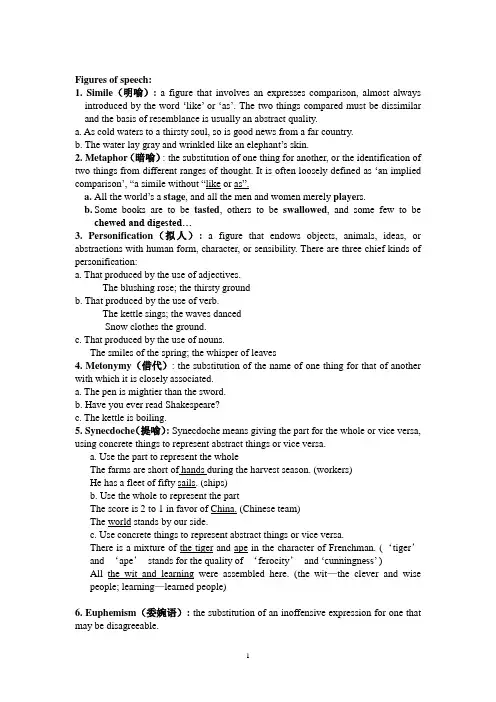
Figures of speech:1. Simile(明喻): a figure that involves an expresses comparison, almost always introduced by the word …like‟ or …as‟. The two things compared must be dissimilar and the basis of resemblance is usually an abstract quality.a. As cold waters to a thirsty soul, so is good news from a far country.b. The water lay gray and wrinkled like an elephant‟s skin.2. Metaphor(暗喻): the substitution of one thing for another, or the identification of two things from different ranges of thought. It is often loosely defined as …an implied comparison‟, “a simile without “like or as”.a.All the world‟s a stage, and all the men and women merely playe rs.b.Some books are to be tasted, others to be swallowed, and some few to bechewed and digested…3. Personification(拟人): a figure that endows objects, animals, ideas, or abstractions with human form, character, or sensibility. There are three chief kinds of personification:a. That produced by the use of adjectives.The blushing rose; the thirsty groundb. That produced by the use of verb.The kettle sings; the waves dancedSnow clothes the ground.c. That produced by the use of nouns.The smiles of the spring; the whisper of leaves4. Metonymy(借代): the substitution of the name of one thing for that of another with which it is closely associated.a. The pen is mightier than the sword.b. Have you ever read Shakespeare?c. The kettle is boiling.5. Synecdoche(提喻): Synecdoche means giving the part for the whole or vice versa, using concrete things to represent abstract things or vice versa.a. Use the part to represent the wholeThe farms are short of hands during the harvest season. (workers)He has a fleet of fifty sails. (ships)b. Use the whole to represent the partThe score is 2 to 1 in favor of China. (Chinese team)The world stands by our side.c. Use concrete things to represent abstract things or vice versa.There is a mixture of the tiger and ape in the character of Frenchman. (‘tiger’and ‘ape’stands for the quality of ‘ferocity’and …cunningness‟ )All the wit and learning were assembled here. (the wit—the clever and wise people; learning—learned people)6. Euphemism(委婉语): the substitution of an inoffensive expression for one that may be disagreeable.a. His departure from this world was peaceful.b. Soap and water will do his collar no harm.c. He is a bit slow for his age.7. Hyperbole(夸张)or Overstatement:a conscious exaggeration for the sake of emphasis, not intended to be understood literally.a. His speech brought the house down.b. It‟s a crim e to stay inside on such a beautiful day.c. The wave ran mountain high.d. One father is more than a hundred schoolmasters.8. Antithesis(反衬): the setting of contrasting phrases opposite each other for emphasis. In true antithesis the opposition between the elements is manifested through parallel grammatical structure.a. A friend exaggerates a man‟s virtues, an enemy his crimes.b. Knowledge makes humble, ignorance make proud.c. The life of the wolf is the death of the lamb.9. Oxymoron(矛盾修辞法): a kind of paradox or antithesis that links together two sharply contrasting terms.a. Love is a sweet torture.b. A glorious defeatc. The greatest hatred springs from the greatest love10. Rhetorical Question(设问): a question neither requiring nor intended to producea reply but asked for emphasis. The assumption is that only one answer is possible.a. To beat such an animal, couldn‟t we win?b. If winter comes, can spring be far behind?11. Irony(反语):the expression of actual intent in words that carry the opposite meaning. It is an effective literary device because it gives the impression of great restraint.a. Robbing a widow of her savings was certainly a noble act.b. Her capacity for family affection is extraordinary; when her third husbands died, her hair turned quite gold from grief.12. Sarcasm(讽刺): a cutting remark, a verbal sneer. Sarcasm pretends to disguise its meaning, but dose not intend to be misunderstood.a.“ Oh, you‟re really a great friend, aren‟t you?”b. He is very generous indeed.13. Ridicule(嘲笑): instance of being made fun ofBryan mopped his bald dome in silence.14. Alliteration(头韵): the use in a phrase or sentence of words beginning with the same letter or sound. Alliteration should be used only when the writer makes a strong emotional response to his subject.a. Love me little love long.b. Money makes the mare go.c. A fair face may hide a foul heart.15. Assonance(元韵): the use of the same, or related, vowel sounds in successive words.a. A deep green steamb. The rain in Spain falls on the plain16. Onomatopoeia(拟声): the use of words that, when pronounced, suggest their meaning.1) She banged the door behind her.2) The rain pattered all night.3) I listened to the rumbling of thunder17.Transferred epithet(移就): the transference of an adjective to a noun to which it is not wholly appropriate.a. Even so, the risk of discovery was beginning to cause Pettit sleepless nights.b. His story achieved nothing but cheap laughs.c. There was a short, thoughtful silence. Then he said, “ Dad, you hav e just worked a profound change in my personality.”18. Pun(双关语): a play on words based on similarity of sound and sharp difference in meaning.a. One shop announced: Darwin is Right----inside.b. It‟s More satisfied.c. Why is an empty purse always the same?Because there is never any change in it.d. On Sunday they pray for you, on Monday they prey on you.19. Periodic Sentence(圆周句): is one in which the meaning is suspended till the close of the sentence.a. The past, with its crimes, its follies, and its tragedies, flashes away.b. Any man or state that fights against Nazidom will have our aid.c. It is a truth universally acknowledged that a single man in possession of a fortune must be in want of a wife.d. At last, with no small difficulty, and after much fatigue, we came, through deep roads and bad weather, to our journey’s end.20. Understatement(低调陈述): It is a statement that says less than could be said truly. It minimizes for effect.a. It is not very courteous to poison a guest.b.London is a village of some size.21. Consonance(和音): partial or total identity of consonants in words or syllables whose main vowels differ.a. Pressed/past window/shadowb. The earthen floor, beaten hard by countless feet, deadens the sound of footsteps.22. Parallelism(平行结构):: the use of phrases, clauses, or sentences that are similar or complementary in structure or in meaning. Parallelism is a form of repetition.We shall fight him by land;We shall fight him by sea;We shall fight him by air.23. Inversion(倒装)Inversion is used to give emphasis or to be rhetorical in more formal situations, in political speeches, on the news, and also in literature.At no time did I say I would accept late homework.From this nothing will turn us---nothing.24. Repetition (重复): the repeated use of the same synonymous words, to add force, clearness or balance to a sentence.a. Blood must atone for bloodb. We will never parley, we will never negotiate…c. Diamond cut diamond.25. Climax(层进): refers to the arrangement of a series of ideas which go from the least important to the most important with steady strengthening of emotion and tone. For example:(1) Made of wordsa. He dare to think, dare to speak, and dares to act.b. Insects, beasts, men, all are creatures.(2) Made of clausesa. I was born an American; I live an American; I shall die an American.b. He has gone, he has escaped, he has broken away.26. Anticlimax (突降):It is the opposite of climax. A series of ideas are arranged in such a way that they go from the most important to the least important with steady weakening of emotion and tone.a. The explosion completely destroyed a church, two houses, and a flowerpot.b. I lost my bag, and with it, my wallet, my I.D. card, and my dirty socks.27. Parody: The humorous imitation of a work of literature, art, or music. A parodyoften achieves its humorous effect through the use of exaggeration or mockery.a. Where there is a will, there is a lawsuit.b. A friend in need is a friend to be avoided.。
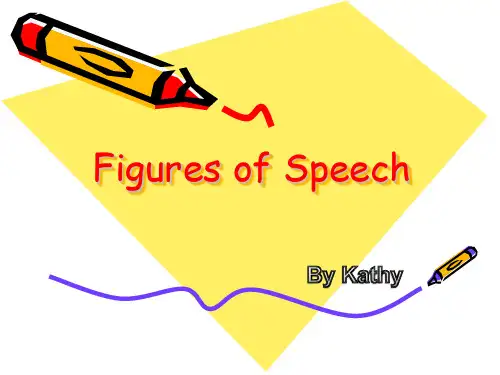

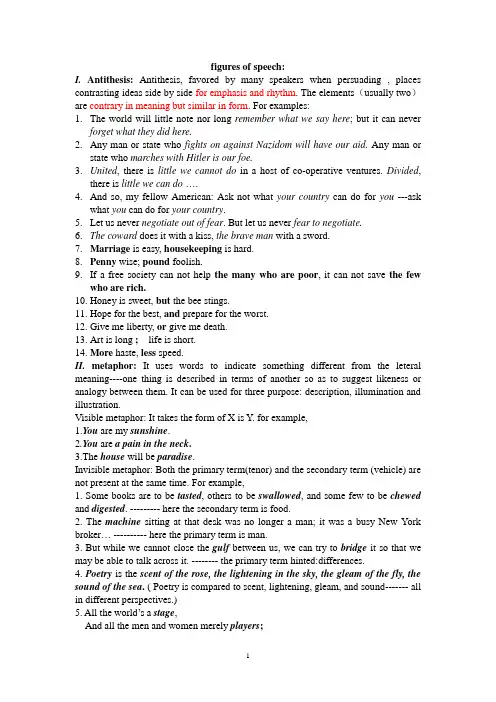
figures of speech:I.Antithesis:Antithesis, favored by many speakers when persuading , places contrasting ideas side by side for emphasis and rhythm. The elements(usually two)are contrary in meaning but similar in form. For examples:1.The world will little note nor long remember what we say here; but it can neverforget what they did here.2.Any man or state who fights on against Nazidom will have our aid. Any man orstate who marches with Hitler is our foe.3.United, there is little we cannot do in a host of co-operative ventures. Divided,there is little we can do ….4.And so, my fellow American: Ask not what your country can do for you ---askwhat you can do for your country.5.Let us never negotiate out of fear. But let us never fear to negotiate.6.The coward does it with a kiss, the brave man with a sword.7.Marriage is easy, housekeeping is hard.8.Penny wise; pound foolish.9.If a free society can not help the many who are poor, it can not save the fewwho are rich.10.Honey is sweet, but the bee stings.11.Hope for the best, and prepare for the worst.12.Give me liberty, or give me death.13.Art is long ; life is short.14.More haste, less speed.II.metaphor: It uses words to indicate something different from the leteral meaning----one thing is described in terms of another so as to suggest likeness or analogy between them. It can be used for three purpose: description, illumination and illustration.Visible metaphor: It takes the form of X is Y. for example,1.You are my sunshine.2.You are a pain in the neck.3.The house will be paradise.Invisible metaphor: Both the primary term(tenor) and the secondary term (vehicle) are not present at the same time. For example,1. Some books are to be tasted, others to be swallowed, and some few to be chewed and digested. --------- here the secondary term is food.2. The machine sitting at that desk was no longer a man; it was a busy New York broker… ---------- here the primary term is man.3. But while we cannot close the gulf between us, we can try to bridge it so that we may be able to talk across it. -------- the primary term hinted:differences.4. Poetry is the scent of the rose, the lightening in the sky, the gleam of the fly, the sound of the sea. ( Poetry is compared to scent, lightening, gleam, and sound------- all in different perspectives.)5. All the world’s a stage,And all the men and women merely players;They have their exits and their entrances,And one man in his time plays many parts,His acts being seven ages…(The initial comparison is “the world is a stage.”It serves as a basic comparison and then it is developed by the consequent comparisons, which serve as its extending part.)6. Laws are cobwebs, where the small flies are caught and the great break.(the initial comparison is “Laws are cobwebs.”And the extending metaphor is the small flies and great flies, which respectively refer to those who come from the lower class and those from the upper class.)Dead metaphor:He is a fox. She is a peacock. An iron heart, the snow white wall, ruby lips, birds of the same feather, a wolf in sheep’s clothing.…….She is an angel of a wife.Love and a cough cannot be hid.The corridor was flooded with boys and girls.Learnig is climbing up a mountain.III. Synecdoche: a part is put for the whole, the whole for a part, the species for the genus, the genus for the species, or the name of the material for the thing made.The part for the wholeHe has many mouths to feed in his family. (mouths for family members)The poor man is now left without a roof. (roof for house)He earned his bread as a dust man. (bread for food)If I has some wheels, I’d put on my best threads and ask for Jane’s hand in marriage. (wheels for car, threads for clothes)The whole for the partShe cut herself in the kitchen. (herself for her finger)My TV is out of order. (TV for the components of a TV set)Italy beat Spain in the football match. (Italy, Spain for the Italy team and the Spanish team respectively)The abstract for the concrete, or the concrete for the abstractAll the wit and learning of the world were assembled there. (wit and learning for the wise people and learned people ----- the abstract for the concrete)The authorities were greeted. (authorities for officials------ the abstract for the concrete)I had the muscle and they made money out of it. (muscle for physical strength ------ the concrete for the abstract)I have his ear, of course. (ear for obedience ---the concrete for the abstract)The species for the genus, or the genus for the speciesDid you see that cutthroat? (cutthroat for murder------ The species for the genus) Alas, that spring should vanish with the rose. (rose for flowers------ The species for the genus)The children were frightened by the cats in the zoo. (cats for tigers, leopards andlions----- the genus for the species)There sits my animal guarding the door to the henhouse. (animal for dog------- the genus for the species)Name of the material for the thing madeHave you any coppers? (coppers for coins that are made of copper)With tears of blood he clenched the hand that held the steel. (steel for sword that is made of steel)He is in irons. (irons for iron shackles or chains)IV. Transferred epithet: it refers to an ornamental adjective or adjectival phrase that co-occurs either with a proper name or with a common noun. 遇有甲乙两个印象连在一起时,作者把原属于甲印象的性状移属于乙印象。
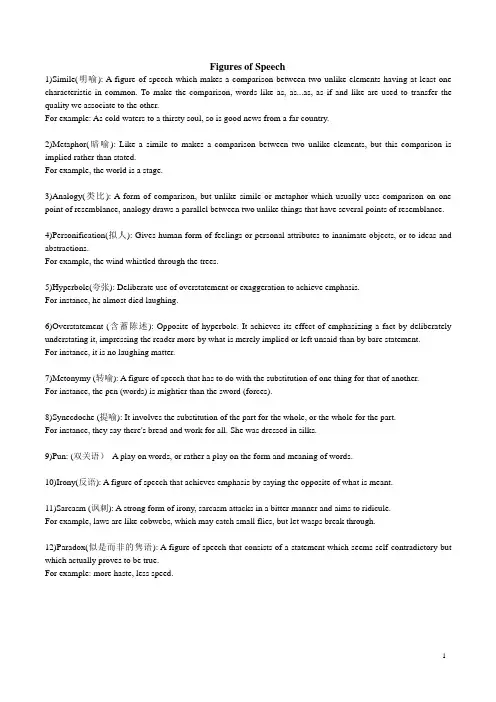
Figures of Speech1)Simile(明喻):A figure of speech which makes a comparison between two unlike elements having at least one characteristic in common.To make the comparison,words like as,as...as,as if and like are used to transfer the quality we associate to the other.For example:As cold waters to a thirsty soul,so is good news from a far country.2)Metaphor(暗喻):Like a simile to makes a comparison between two unlike elements,but this comparison is implied rather than stated.For example,the world is a stage.3)Analogy(类比):A form of comparison,but unlike simile or metaphor which usually uses comparison on one point of resemblance,analogy draws a parallel between two unlike things that have several points of resemblance.4)Personification(拟人):Gives human form of feelings or personal attributes to inanimate objects,or to ideas and abstractions.For example,the wind whistled through the trees.5)Hyperbole(夸张):Deliberate use of overstatement or exaggeration to achieve emphasis.For instance,he almost died laughing.6)Overstatement(含蓄陈述):Opposite of hyperbole.It achieves its effect of emphasizing a fact by deliberately understating it,impressing the reader more by what is merely implied or left unsaid than by bare statement.For instance,it is no laughing matter.7)Metonymy(转喻):A figure of speech that has to do with the substitution of one thing for that of another.For instance,the pen(words)is mightier than the sword(forces).8)Synecdoche(提喻):It involves the substitution of the part for the whole,or the whole for the part.For instance,they say there's bread and work for all.She was dressed in silks.9)Pun:(双关语)A play on words,or rather a play on the form and meaning of words.10)Irony(反语):A figure of speech that achieves emphasis by saying the opposite of what is meant.11)Sarcasm(讽刺):A strong form of irony,sarcasm attacks in a bitter manner and aims to ridicule.For example,laws are like cobwebs,which may catch small flies,but let wasps break through.12)Paradox(似是而非的隽语):A figure of speech that consists of a statement which seems self-contradictory but which actually proves to be true.For example:more haste,less speed.1。
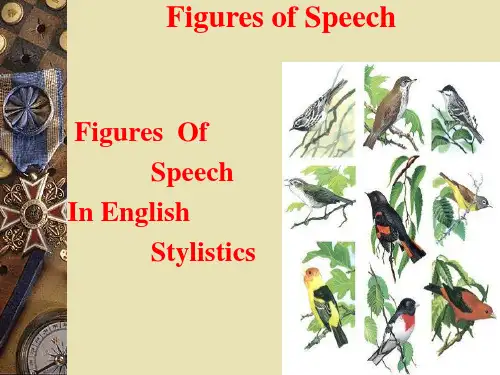
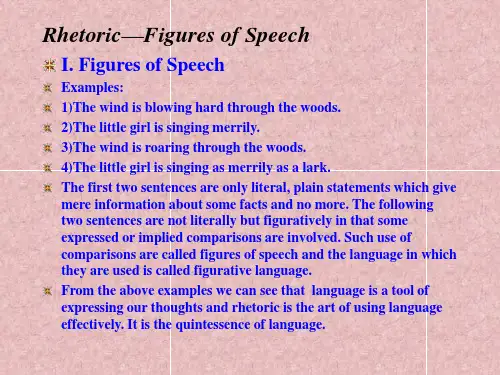
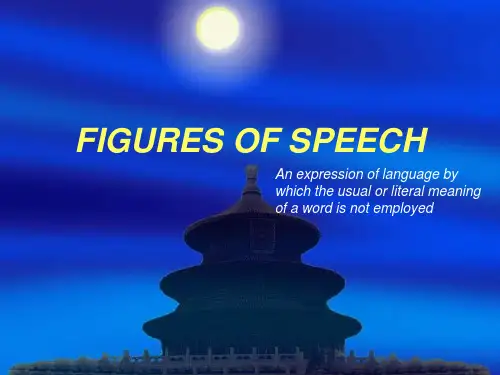
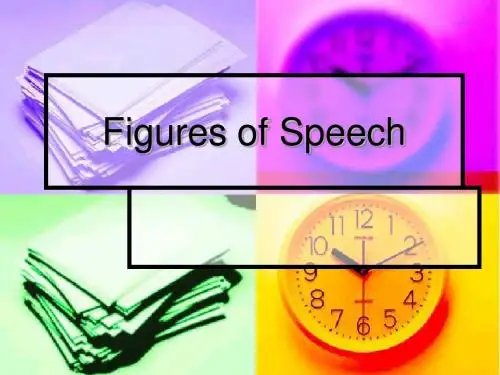
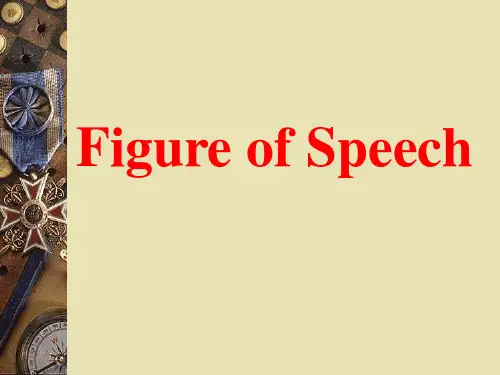
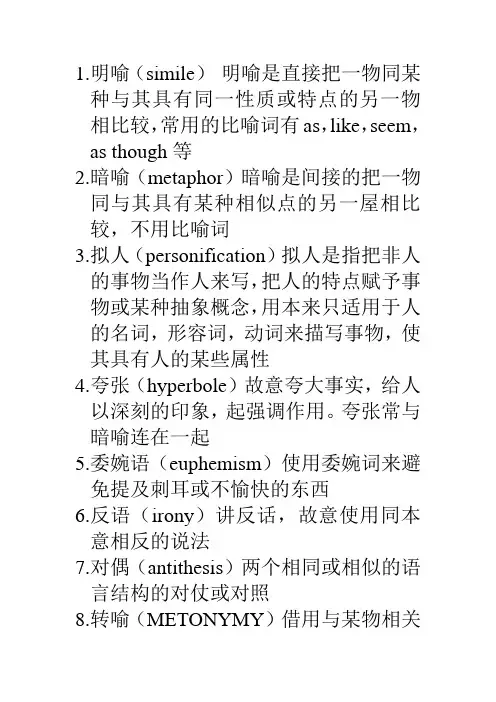
1.明喻(simile)明喻是直接把一物同某种与其具有同一性质或特点的另一物相比较,常用的比喻词有as,like,seem,as though等
2.暗喻(metaphor)暗喻是间接的把一物同与其具有某种相似点的另一屋相比较,不用比喻词
3.拟人(personification)拟人是指把非人的事物当作人来写,把人的特点赋予事物或某种抽象概念,用本来只适用于人的名词,形容词,动词来描写事物,使其具有人的某些属性
4.夸张(hyperbole)故意夸大事实,给人以深刻的印象,起强调作用。
夸张常与暗喻连在一起
5.委婉语(euphemism)使用委婉词来避免提及刺耳或不愉快的东西
6.反语(irony)讲反话,故意使用同本意相反的说法
7.对偶(antithesis)两个相同或相似的语言结构的对仗或对照
8.转喻(METONYMY)借用与某物相关
或关联的东西代称某物
Gray hair should be respected 老人应该受到尊重这里的gray hair代表老人
9.类比(ANALOGY)巴两种本质上不同的事物之间的共同点加以比较,来说明道理,把抽象的概念具体化,吧深奥的哲理浅显化
10.矛盾修饰法(oxymoron)修饰语与被修饰语之间看来似乎是矛盾的,但实则相反相成poor rich men 贫穷的富人
11.对照(contrast)把意义相反的字词、短语或句子等平行的排列起来,在结构上对称,揭示出事物间的对立或矛盾12.排比(parallelism)结构类似的句子成分或句子,几个单词连串。
• 1. Simile•Definition:•It is a comparison between two distinctly different things and the comparison is indicated by the word as or like.•• 2. metaphor•the substitution of a word for another word whose meaning is close to the original word• A metaphor is generally supposed to be one thing equated with another thing, such as:•"a" is "b".•there must a common ground between "a" and "b".• For example, in English, a common metaphor is:•John is a teddy bear.•Tenor = The subject of the metaphor (i.e., "a" in: "a" is "b")•Vehicle = The subject compliment of the metaphor (i.e., "b" in: "a" is "b")•Ground = The culturally understood commonality between the tenor and the vehicle Many metaphors are "hidden",i.e., not so obvious•I made up my mind to do something.•Therein above, the metaphor is "hidden" from view.•The actual metaphor is: my mind is material/matter that can be composed.•Tenor = mindVehicle = material/matter that can be composedCommon Ground = both are changeable; both are able to be manipulated •Grasp a concept•• 3. Personification•Personification: (拟人)It gives human form of feelings to animals, or life and personal attributes to inanimate(无生命的) objects, or to ideas and abstractions •For example,•The water beckoned invitingly to the hot swimmers.Tell us the object being personified and the meaning of the personification.•The wind sang her mournful song through the falling leaves.•The strawberries seemed to sing, "Eat me first!“; "Eat me first!"•The rain kissed my cheeks as it fell.•The daffodils nodded their yellow heads at the walkers.•The snow whispered as it fell to the ground during the early morning hours.•The china danced on the shelves during the earthquake.•The car engine coughed and sputtered when it started during the blizzard.•Metonymy (转喻)It is a figure of speech that has to do with the substitution of the name of one thing for that of another with which it is closely associated.• 4. Metonymy• A metonymy is similar to a metaphor, but different in function.•The function of a metaphor is understanding.•The function of a metonymy is reference••The crown ordered all soldiers to arms.•[crown = king]•The pen is mightier than the sword.•[pen = writer; sword = fighter]•The Pentagon announced it's new policy yesterday.•[Pentagon = chiefs of staff at the Pentagon]•The White House called a press conference.•[White House = chiefs of staff at the White House]•Hopefully, 9/11 will never happen again.•[9/11 = the destruction of the World Trade Center Towers in New York on that day: 9/11/2001]•• 5. Synecdoche• A figure of speech in which a part is used for the whole, the whole for a part , the specific for the general, the general for the specific ,or the material for the thing from which it is made•提喻法•There are two mouths to feed in my family.•[mouth = person]•China beat Japan in this exciting Ping-pong game.•[China = China Ping-pong player ]•I count twenty heads at the party.•[head = person]•Two beers, please6. Euphemism•Euphemism : (委婉)It is the substitution of an agreeable or inoffensive expression for one that may offend or suggest something unpleasant.•Example: you are fired.•career change opportunity,•downsizing, restructuring,•workforce imbalance correction•dustmen=refuse collectors•road sweepers=street orderliesGuess what they are•education welfare manager•truancy officer•"utensil maintenance man"•dishwasher•appearance engineer or a tonsorial artist•hairdresser•canine control officer•dog-catcher•customer operations leader\senior conductor•railway train guard•bonus•bribe•7. IronyIrony: (反语)It is a figure of speech that achieves emphasis by saying the opposite of what is meant, the intended meaning of the words being the opposite of their usual sense.8. Overstatement\ Hyperbole•Hyperbole: (夸张)It is the deliberate use of overstatement or exaggeration to achieve emphasis. For instance,•Hamlet: I loved Ophelia: forty thousand brothers could not, with all their quantity of love, make up my sum.•His eloquence could split rocks.•I'd give my whole fortune for a bowl of bean soup.•9. Understatement•Understatement: (含蓄陈述)It is the opposite of hyperbole, or overstatement. It achieves its effect of emphasizing a fact by deliberately understating it, impressing the listener or the reader more by what is merely implied or left unsaid than by bare statement.•if one were in a desert where the temperature was 45 degrees,•and if one were to describe thermal conditions saying "It's a little warm today." that would be an understatement.10. Transferred Epithet•Transferred Epithet: (转类形容词)It is a figure of speech where an epithet (an adjective or descriptive phrase) is transferred from the noun it should rightly modify to another to which it does not really apply or belong.•For instance, I spent sleepless nights on my project.•restless night\happy morning•"The ploughman homeward plods his weary way" -Thomas Gray11. Oxymoron•Oxymoron: (矛盾修饰)It is a compressed paradox, formed by the conjoining of two contrasting, contradictory or incongruous(不协调) terms as in bitter-sweet memories, orderly chaos .•open secret•larger half•clearly confused•act naturally•pretty ugly•Hell's Angels•deafening silence•virtual reality•living dead•only choice•tragic comedy•working holiday••12. Alliteration•Alliteration: (头韵)It has to do with the sound rather than the sense of words for effect. It is a device that repeats the same sound at frequent intervals and since the sound repeated is usually the initial consonant sound, it is also called "front rhyme".•For instance,•the fair breeze blew, the white foam flew, the furrow followed free.•Tongue twisters•13. OnomatopoeiaOnomatopoeia: (拟声)It is a device that uses words which imitate the sounds made by an object (animate or inanimate), or which are associated with or suggestive of some action or movement.14. Pun•Pun: (双关语)It is a play on words, or rather a play on the form and meaning of words.•For instance,•He is not a grave man until he is a grave man.•They pray for you today and prey on you tomorrow.•他们今天为你祈祷,明天就会加害于你。
FIGURES OF SPEECHWhat’s figure of speech?Figures of speech refer to those rhetorical devices in which words are made to mean other than what they would normally imply, and therefore involve deviation from the ordinary and literal meaning of words, they are ways to make our language figurative, more meaningful, more colorful.We are speaking or writing figuratively when we use words in non-literal senses to lend force to an idea, to heighten effect, or to create atmosphere. Compare the following sentences in effect:1.T he stars twinkle like diamonds.2.T he stars shine brightly.3.I mperialism is a paper tiger.4.I mperialism appears to be strong butinwardly it is weak.Which is more vivid and colorful? Which is more suggestive of outward ferocity and inner weakness?The figures can help not only in deepening our understanding of what we read, but also in appreciating more fully the writers’ view and style. We might even learn to write better. In fact, effective writing of any kind is seldom without a figure or two.I. What is a metaphor? And what is a simile? What is personification?1.A metaphor, makes a comparison betweentwo unlike things, but with a point of resemblance. This comparison is implied rather than stated. It requires greater ability of the reader to perceive the hidden association, the insight into persons, things or ideas.For instance,“Money is a lens in a camera”.What is the implied association, the common quality, the point of resemblance?Our knowledge of photography tells us that a lens in a camera can reflect and record images of persons or things sharply andobjectively. This leads us to the thought that money or the greed for money can also cause people to reveal their true feelings or characters.So the common quality between the two is that both money and a lens can show up people as truthfully and objectively.2.A simile also makes a comparison betweenthe two unlike elements having at least one quality or character on common.. The comparison is imaginative, that is, the resemblance between the two unlike things exists only in our minds, in our inward eye and in the nature of the things themselves.Sometimes the association is between unfamiliar things, or between abstract and concrete images. The stronger the association that is felt, the greater the force of the comparison, the stronger the power of suggestion and the sharper the image produced.3.W hat’s the difference between a simile anda metaphor?1)simile: the comparison is indicated/showed by: l ike; as; as…as; as if; asthough; (just) as…so.2)Metaphor: The comparison is implied.4.P ersonification is a figure of speech that gives human form or feelings to animal, or life and personal attributes to inanimate objects, or to ideas and abstractions, a n act of personifying sth. that is not human being. e.g.I ran across a dim photograph of himthe other day, going through some oldthings. He’s been dead twenty-five years.His name was Rex… and he was abull-terrier.(Here a dog is personified.) Personification: aCompare the following sentences, see what figures of speech exist in them:1.J im looks like his brother Billy.2.J im and Billy are as like as two peas.3.T he whining schoolboy, with his satcheland shining morning face, creeping likesnail unwillingly to school.4.T he hallway was zebra-striped withdarkness and moonlight.5.R ecords fell like apples on a windy day.6.A s cold waters to a thirsty soul, so is goodnews from a far country.7.C ampaign posters sprouted across theland like wild flowers after a spring rain.8.T he wind whistled through the trees.9.I f not always in a hot mood to smash, thesea is always stealthily ready for a drowning.What is synecdoche?It’s the substitution of the part for the whole, or the whole for the part.1.T hey counted fifty sails in the harbour.2.T he birds sang to welcome the smilingyear.Here is a list of examples:A.The part for the whole1.h anda)member of a ships’crewb)worker, laborer, helper2.h eadperson3.b readfood, esp. staple foodB. The whole for the part1.A ustralia beat Canada at cricket.C. Name of material for the thing made1.H e walked the boards for a living.D. The container for the thing contained or vice versa1.T he kettle is boiling.Some more examples for you to distinguish: (which of the following words belong to “synecdoche” )1.A las, that Spring should vanish with theRose.2.H e paid the workers $5 per head.3.H e’s the bread earner of the family.4.T he legs could hardly keep up with thetanks.5.T hey were short of hands at harvest time.6.S he was dressed in silks and satins.7.T wo beers, please.Figure of speech (definition)1.s imile2.m etaphor:a comparison made between things with similarities/resemblance/hidden association 3. ironyTo achieve emphasis/fun by saying the opposite of what is meant. ( the intended meaning of the words being the opposite of their usual sense)Eg. Describe a very fat man as “ skinny” or: slim”4.m etonymya substitution of the name of one thing for that of another, the substituted name suggesting the thing meant. In other words, it involves a “change of name”.5.s ynecdochea substitution of the whole for the part or the part for the whole6.a ntithesiscontrast ing words/ideas in balanced structure ( to achieve force and emphasis)7.p arallelismbalanced structure ( necessary to balance word for word, phrase for phrase, sentence for sentence…)8.a lliterationfirst consonants are repeated in more than one words at intervals9.p ersonificationPersonification is a figure of speech that gives human form or feelings to animal, or life and personal attributes to inanimate objects, or to ideas and abstractions, a n act of personifying sth. that is not human being.10.pun: To pun is to play the words, forwitty or humorous effect, which l ook or sound alike, but have different senses/connotations11.Hyperbole: overstate or exaggerate sth. in order to make it sound bigger, smaller, better, worse, etc. than it really isexaggeration/ overstatement/ boasting11.understatement ( litotes and meiosis )It is the opposite of hyperbole, or overstatement. It emphasize a fact by deliberately understating it,making it more impressive by what is only implied or left unsaid than by bare statement.12.transferred epithetan epithet is transferred/ moved away from a person to a thing/ idea, to modify sth that it doesn’t belong to13.paradoxa statement which seems wrong, but actually true on further consideration.14.oxymorona compressed paradox, formed by two contradictory terms.15.euphemismsay sth in a better and indirect way17. onomatopoeiathe imitation/copy of sounds18. climax19. anti-climax20. rhetorical questions21. analogy:A form of comparison to concentrate on one point of resemblance, to draw a parallel between two unlike things that have several common qualities/resemblance. It’s chiefly for persuasion/explanation/exposition.22. assonance: It is the “echoing” or “resemblance” of vowel sounds in the stressed syllables of a sequence of words, as in “ a h ot co pper sky” or “children just let l oose from school.Poets of all ages have used this device effectively to convey various sensory impressions.Exercise 1. Tell what is the figure of speech inthe following sentences:1.M oney is a lens in a camera.2.T i pan Alley has moved to another cityfrom New York.3.T he kettle is boiling.4.Y ou are staying , I am going.5.L et’s create a government of the people,by the people, for the people.6.L et’s tell both out friends and foe.7.T he big wind whip the house and trees.8.H er mouth is as red as a watermelon.9.T hey watched the storm from theirspectacular point.10.Where every one has a status, nobodyhas a status.11. a biter sweet memoriesproud humilityHe had his victorious defeat.12.This is the men’s final release fromearthly care/struggle: they vanish from a world where they were of no result; wherethey achieved nothing; where they were a mistake and a failure and a foolishness; where they have left no sign; a world will lament them a day and forget them forever!13.The chess-board is the world, the pieces are the phenomena of the universe, the rules of the game are what we call the laws of nature. The player on the other side is hidden from us. We know that his play is always fair, just and patient. But also we know, to our cost, that he never overlook a mistake, or makes the smallest allowance for ignorance. To the man who plays well, the highest stakes are paid, with that sort of overflowing generosity with which the strong shows delight in strength. And one who plays ill is checkmated---without haste, but without remorse. (T.H. Huxley)( Man vs nature, who will win? Huxley uses the analogy of two players in a chess game to explain that Man will succeed only if he plays by the laws of nature.)Exercises 2. : Distinguish the figure of speech in the following:1.S o much of well-to-do America now live in this area.2.T he child was pretty and intelligent( The child was pretty and had brains.)3.w e shall fight for the government of the people, by the people, for the people.4.S peech is silver; silence is gold.5.T he wind whistled through the trees.6.I f not always in a hot mood to smash, the sea is always stealthily ready for drowning.7.H e almost died laughing.8.S he sells sea-shells on the sea shore,Peter piper picked a peck of pickled paper.9.T hey counted fifty sails in the harbor.10.He was a man of no mean wealth. ( …quite rich )11.It’s no laughing mater. (…serious matter )12.I did not half like him. ( …like him very much )13.Adv anced field training isn’t going to be a lark. ( …not going to be very easy /fun ) 14.“Don’t worry. It’s only a little scra tch, “ he said, though he had been badly hurt by the tiger.15. Thou still unravished bride of quliteness.Keys for reference: Exercises 1:(it is in order of the definition)1.m etaphor:2.m etonymy3.s ynecdoche4.a ntithesis5.p arallelism6.a lliteration7.p ersonification8.h yperbole9.t ransferred epithet10.paradox11.oxymoron12.euphemism, parallelism, antithesis13.analogyKeys for reference: Exercises 2:1.m etonymy2.p arallelism3.p arallelism4.a ntithesis5.p ersonification/onomatopoeia6.p ersonification7.h yperbole8.a lliteration9.s ynecdoche10---14. understatement。
Figure of SpeechFigures of speech (修辞)are ways of making our language figurative. When we use words in other than their ordinary or literal sense to lend force to an idea, to heighten effect, or to create suggestive imagery, we are said to be speaking or writing figuratively. Below are some common forms of figures of speech. Simile:(明喻)It is a figure of speech which makes a comparison between two unlike elements having at least one quality or characteristic (特性)in common. To make the comparison, words like as, as...as, as if and like are used to transfer the quality we associate with one to the other. For example, my love is like a red red rose.1)Metaphor:(暗喻)It is like a simile, also makes a comparison between twounlike elements, but unlike a simile, this comparison is implied rather than stated. For example, the world is a stage.2)Analogy: (类比)It is also a form of comparison, but unlike simile or metaphorwhich usually uses comparison on one point of resemblance, analogy draws a parallel between two unlike things that have several common qualities or points of resemblance.For example:The cultivation of a hobby and new forms of interest is… not a business that can be undertaken in a day or swiftly improved by a mere command of the will. The growth of alternative mental interests is a long process. The seeds must be carefully chosen; they must fall on a good ground; they must be sedulously tended, if the vivifying fruits are to be at hand when needed.3) Personification: (拟人)It gives human form of feelings to animals, or life and personal attributes(赋予) to inanimate(无生命的) objects, or to ideas and abstractions(抽象). For example, the wind whistled through the trees.4) Hyperbole: (夸张)It is the deliberate use of overstatement or exaggeration to achieve emphasis. For instance, he almost died laughing.5) Understatement: (含蓄陈述) It is the opposite of hyperbole, or overstatement. It achieves its effect of emphasizing a fact by deliberately(故意地) understating it, impressing the listener or the reader more by what is merely implied or left unsaid than by bare statement. For instance, this project is nothing to be proud of.6) Euphemism: (委婉)It is the substitution of an agreeable or inoffensive(无冒犯) expression for one that may offend or suggest something unpleasant. For instance, we refer to "die" as " pass away".7) Metonymy (转喻)It is a figure of speech that has to do with the substitution of the mane of one thing for that of another. For instance, the pen (words) is mightier than the sword (forces).8) Synecdoche (提喻) It is involves the substitution of the part for the whole, or the whole for the part. For instance, we need ten hands.9) Pun: (双关语)It is a play on words, or rather a play on the form and meaning of words. For instance, a cannon-ball took off his legs, so he laid down his arms. (Here "arms" has two meanings: a person's body; weapons carried by a soldier.)10) Syllepsis: (一语双叙) is a figure by which a wordrefers to two or more words in the same sentence. For example, while he was fighting , and losing limb and mind, and dying, others stayed behind to pursue education and career. (Here to losing one's limbs in literal; to lose one's mind is figurative, and means to go mad.)11) Irony: (反语)It is a figure of speech that achieves emphasis by saying the opposite of what is meant, the intended meaning of the words being the opposite of their usual sense. For instance, we are lucky, what you said makes me feel real good.12) Innuendo: (暗讽)It is a mild form of irony, hinting in a rather roundabout (曲折)way at something disparaging(不一致) or uncomplimentary(不赞美) to the person or subject mentioned. For example, the weatherman said it would be worm. He must take his readings in a bathroom.13) Sarcasm: (讽刺)It Sarcasm is a strong form of irony. It attacks in a taunting and bitter manner, and its aim is to disparage, ridicule and wound the feelings of the subject attacked. For example, laws are like cobwebs, which may catch small flies, but let wasps break through.14) Paradox: (似非而是的隽语)It is a figure of speech consisting of a statement or proposition which on the face of it seems self-contradictory, absurd or contrary to established fact or practice, but which on further thinking and study may prove to be true, well-founded, and even to contain a succinct point. For example more haste, less speed.15) Oxymoron: (矛盾修饰)It is a compressed paradox, formed by the conjoining(结合) of two contrasting, contradictory or incongruous(不协调) terms as in bitter-sweet memories, orderly chaos(混乱) and proud humility(侮辱).16) Antithesis: (对照)It is the deliberate arrangement of contrasting words orideas in balanced structural forms to achieve emphasis. For example, speech is silver; silence is golden.17) Climax: (渐进)It is derived from the Greek word for "ladder" and implies the progression of thought at a uniform or almost uniform rate of significance or intensity, like the steps of a ladder ascending evenly. For example, I came, I saw, I conquered.18) Anti-climax or bathos: (突降)It is the opposite of Climax. It involves stating one's thoughts in a descending order of significance or intensity, from strong to weak, from weighty to light or frivolous. For instance, As a serious young man, I loved Beethoven, Keats, and hot dogs.19) Apostrophe:(顿呼)In this figure of speech, a thing, place, idea or person (dead or absent) is addressed as if present, listening and understanding what is being said. For instance, England! awake! awake! awake!20) Transferred Epithet: (转类形容词) It is a figure of speech where an epithet (an adjective or descriptive phrase) is transferred from the noun it should rightly modify(修饰) to another to which it does not really apply or belong. For instance,I spent sleepless nights on my project.21) Synesthesia (通感) from Greek words that mean blended feeling. It is the perception or interpretation of the data of one sense in terms of another. For example, I met a blind girl who thought the sky tasted like cold metal when it rained.Exercise1.How soon hath Time, the subtle thief of youth, stolen on his wing my threeand twentieth year! (Milton)2.Heavy raindrops began pitter-pattering on the tent.3.Twinkle, twinkle, little bat,How I wonder what you’re at!Up above the world you flyLike a teatray in the sky. (Lewis Carrol)4.Every time she went to a party, the woman put on ornaments and airs.5.Judicious praise is to children what the sun is to flowers.6.An individual human existence should be like a river--- small at first,narrowly contained within its banks, and rushing passionately past boulders and over waterfalls. Gradually the river grows wider, the banks recede, the waters flow more quietly, and in the end, without any visible break, they become merged in the sea, and painlessly lose their individual being.( Bertrand Russell)7.…ifI could touch youmy hands would begin to sing…(Mary Oliver)8.Nothing disturbed it: not the owl that camerowingout at noon, soundless as fur… (Amy Clampitt)9.I farm a pasture where the boulders lieAs touching as a basket full of eggs… (Robert Frost)10.you gave me dandelions…round suns risingin April, soft moonsblowing away in June… (Linda Pastan)11.Scepter and crownMust tumble down,And in the dust be equal madeWith the poor crooked scythe and spade. (James Shirley)12.I eye the statue with an awed contempt…. (Robert Lowell)13.I wouldLove you ten years before the FloodAnd you should, if you please, refuseTill the conversion of the Jews.( Andrew Marvell)14.Golden lads and girls all must,As chimney sweepers, come to dust.15.I had even forgotten how married loveis a territory more mysteriousthe more it is explored, like one of those terrainsyou read about, a garden in the sesertwhere you stoop to drink, never knowingif your mouth will fill with water or sand. ( LindaPastan, ‘after an absence’)。
Test 1 V. Identify the figures of speech in the following sentences and give the correct terms in English for each of the italicized parts. (10 points)
1. Beware of little expenses. A small leak will sink a great ship. 2. Only the knife can save him. 3. Brutus. … As Caesar loved me, I weep for him; as he was fortunate, I rejoice at it; as he was valiant, I honour him; but, as he was ambitious, I slew him. 4. The sun smiled down on the green meadows. 5. O, my luve is like a red red rose That newly sprung in June: O, my luve is like the melodie That’s sweetly played in tune. 6. That murderer has been put into the condemned cell. 7. My car was stolen, my house burned down, and I forgot to tie my shoes. 8. For many are called, but few are chosen. 9. You could shave with the razor-sharp crease in his trousers. 10. Who does not love his country?
Key to test 1 1. metaphor 2. metonymy 3. parallelism 4. personification 5. simile 6. transferred epithet 7. anticlimax 8. antithesis 9. exaggeration(hyperbole) 10. rhetorical question
Test 2
V. Identify the figures of speech in the following sentences and give the correct terms in English for each of the italicized parts. (10 points)
1. She sells sea-shells on the seashore. 2. Holding the muleta, with the sword in his left hand widening it in front of him, he called to the bull. The bull looked at him. He leaned back insultingly and shook the widespread flannel. The bull saw the muleta …. 3. Didn’t I tell you he would forget? 4. The more haste, the less speed. 5. Edna. … My feet are absolutely killing me. 6. It was the ruin of the family, the uprooting of morals, the destruction of Germany. 7. And then with his next words he achieved rank (as his thoughts ran) with either the great crowd of the world’s sympathizers or the little crowd of its great financiers. 8. He is now again seated in his usual sleepy corner. 9. He was a beautiful horse that looked as though he had come out of a painting by Velasquez. 10. The wind whistled through the trees. Key to Test 2 1. alliteration 2. repetition 3. rhetorical question 4. paradox 5. hyperbole 6. climax 7. antithesis 8. transferred epithet 9. simile 10. personification
Test 3. V. Identify the figures of speech in the following sentences and give the correct terms in English for each of the italicized parts. (10 points) 1. Sons are the anchors of a mother’s life. 2. The press is becoming more and more the vehicle of opinion. 3. He pulled his head back into the bedroom, looked around, saw his jacket, picked it up and put it on. 4. Dawn was beginning to prowl about the sky and put out the stars. 5. The full green hills are round and soft as breasts. 6. He passed many an anxious hour in the train. 7. Alas! Alas! What shall I do? I’ve lost my wife and best hat, too. 8. A miser grows rich by seeming poor. An extravagant man grows poor by seeming rich. 9. I’ve told you hundreds of times not to leave the door open. 10. Predictably the winter will be snowy, sleety, and slushy. Key to test 3 1. metaphor 2. metonymy 3. parallelism 4. personification 5. simile 6. transferred epithet 7. anticlimax 8. antithesis 9. hyperbole 10. alliteration
test 4
V. Identify the figures of speech in the following sentences and give the correct terms in English for each of the italicized parts. (10 points)
1. He sat on a log, the invisible compass in his invisible hand, … 2. The flakes were falling thick and hard now, pouring past the window, a waterfall of mystery. 3. The trumpet of a prophecy! O, Wind, If Winter comes, can Spring be far behind? 4. Yet, those who have eyes apparently see little. The panorama of color and action which fills the world is taken for granted. 5.She told him he was cold and selfish and ungrateful. 6. The world will little note, nor long remember what we say here, but it can never forget what they did here. 7. Above us hung a sullen sky. 8. As cold waters to a thirsty soul, so is good news from a far country. 9. Can’t you just see Success, Health, and Happiness beckoning to you? 10. He was too fond of the bottle. Key to test 4 1. repetition 2. alliteration 3. rhetorical question 4. paradox 5. climax